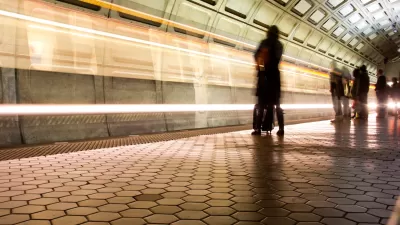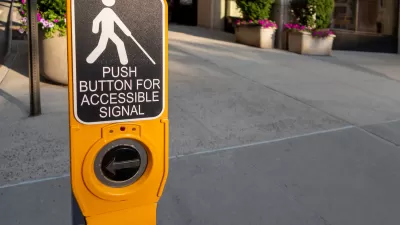A federal judge ruled that the city fails to provide “meaningful access” to many of its streets due to a lack of infrastructure for pedestrians with vision impairments at most of the city’s intersections.

A federal judge ruled that the City of Chicago has not provided sufficient accommodations for people with disabilities in violation of the Americans with Disabilities Act (ADA), reports Eli Ong for WGN 9. “The complaint, filed at the time by the federal government, alleged the City failed to provide people who are blind, have low vision or are deaf-blind with accessible pedestrian signals (APS’s) at intersections, e.g., the equivalent of ‘walk/don’t walk’ visual signals that indicate when it is safe to cross the street for pedestrians without visual disabilities.”
According to Ong, “fewer than 1% of intersections equipped to provide sighted pedestrians visual signals (nearly 2,800) were equipped with APS’s for people who are blind or have low vision.” This amounts to a lack of “meaningful access” to the city’s transportation network and, per a press release from Disability Rights Advocates, “may be the worst of any major metropolitan area in the United States.”
In the same press release, Jelena Kolic, Senior Staff Attorney at Disability Rights Advocates, says, “Chicago has long been famous for its walkability. Thanks to this decision, blind residents will be much better equipped to enjoy that walkability.” The decision also “sends a message to cities and towns across the state and around the country that they can no longer deny pedestrians who are blind full and equal access to signalized intersections,” says Ray Campbell, one of the plaintiffs in the case.
FULL STORY: Federal judge finds City of Chicago liable, violated Americans with Disabilities Act

Maui's Vacation Rental Debate Turns Ugly
Verbal attacks, misinformation campaigns and fistfights plague a high-stakes debate to convert thousands of vacation rentals into long-term housing.

Planetizen Federal Action Tracker
A weekly monitor of how Trump’s orders and actions are impacting planners and planning in America.

Chicago’s Ghost Rails
Just beneath the surface of the modern city lie the remnants of its expansive early 20th-century streetcar system.

Bend, Oregon Zoning Reforms Prioritize Small-Scale Housing
The city altered its zoning code to allow multi-family housing and eliminated parking mandates citywide.

Amtrak Cutting Jobs, Funding to High-Speed Rail
The agency plans to cut 10 percent of its workforce and has confirmed it will not fund new high-speed rail projects.

LA Denies Basic Services to Unhoused Residents
The city has repeatedly failed to respond to requests for trash pickup at encampment sites, and eliminated a program that provided mobile showers and toilets.
Urban Design for Planners 1: Software Tools
This six-course series explores essential urban design concepts using open source software and equips planners with the tools they need to participate fully in the urban design process.
Planning for Universal Design
Learn the tools for implementing Universal Design in planning regulations.
planning NEXT
Appalachian Highlands Housing Partners
Mpact (founded as Rail~Volution)
City of Camden Redevelopment Agency
City of Astoria
City of Portland
City of Laramie





























